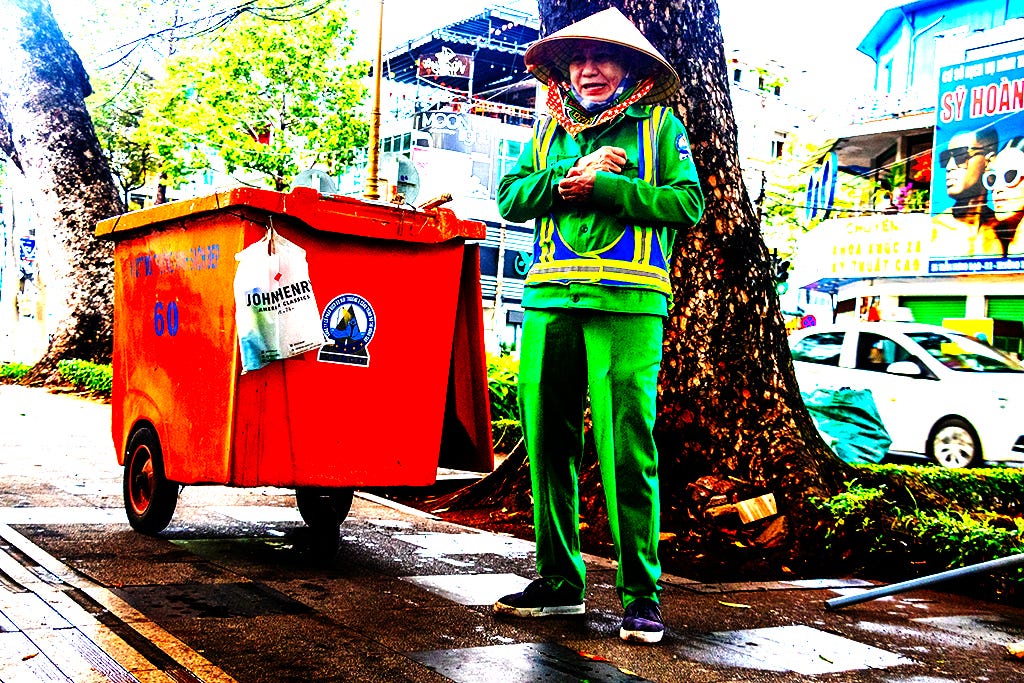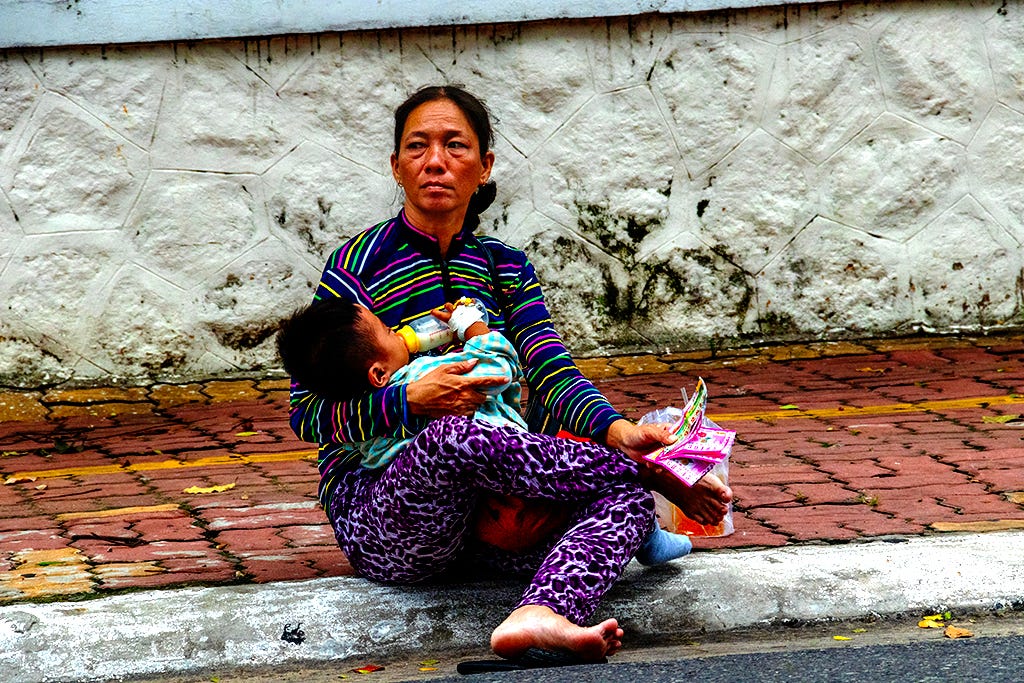[Vung Tau, 9/4/24]
At the café on General Uprising, the music is kept low. Often, it’s drown out by conversations, especially when Tank Top and his outrages du jour is around. This morning, I was again the first customer. The first song played was Ngô Thụy Miên’s “Ga chiều phố nhỏ.” Those four Vietnamese syllables translate most accurately as Train Station at Evening on a Small Street. Like Chinese, Vietnamese is a very compact language. The music of its poetry, then, is entirely different from what you’d find in English, French, Spanish or Italian.
The composer’s penname is already a poem. Though Thụy and Miên both mean sleep, thụy alludes to thụy du, meaning sleepwalking, while miên suggests thôi miên, meaning hypnotize. Hypnotized, this Ngô dude is sleepwalking through life writing love songs. Interviewed in 2018 at age 70, he said:
To me, war is only an episode. It’s love that’s eternal. Starting out in music, I chose for myself a direction, and that’s to write love song. Before and after me, there are composers who write about about war, our homeland and individual plights. We all contribute to Vietnamese music, each with his tendencies. I just want to be remembered as a writer of love songs, no more or less.
In “Ga chiều phố nhỏ,” a man waits for his lover at the train station. She does not come. Walking away dejected, he hears the train whistle sobs, but “rưng rức” means much more. Rưng is to have tears well up in one’s eyes. Rức means very quiet and steady. Rưng rức, then, is to sob very quietly and steadily. I cite these idiosyncrasies to prove, once again, that it’s almost impossible for outsiders to penetrate any language. It’s a private conversation you ain’t supposed to understand!
Ngô Thụy Miên’s family owned a bookstore in Hải Phòng, a port city heavily bombed during the Vietnam War. By then, he had relocated to Saigon. At its music conservatory, Thụy Miên was trained as a violinist. Since Saigon at war didn’t have a philharmonic orchestra, he became an air traffic controller at Tân Sơn Nhất Airport. Watching Hollywood “Vietnam” flicks, you’d think Saigon was just a madhouse with whores and Russian Roulette, with savages hurling spears at you outside its limits.
Shortly after the Fall of Saigon, Thụy Miên escaped by boat from Vung Tau, not three miles from where I’m sitting, to reach Malaysia’s Bidong Island, roughly 600 miles away. Of course, his barely seaworthy craft overloaded with starving and thirsty refugees didn’t drift or bobble straight. It wasn’t a direct flight.
In a refugee camp, Thụy Miên wrote a song dedicated to his girlfriend, whom he had met at the conservatory. Consider these lines:
All cities you will pass through, Here Paris, here London, here Vienna, but Nowhere will be equal to Saigon of yesterday. Nowhere will be equal to Saigon of tomorrow.
After six months in Bidong Island, Thụy Miên was given asylum by Canada. In Montreal, he was reunited with his girlfriend, who flew up from San Diego. By 1980, the married couple was living in Olympia, Washington. Settled with jobs and children, they’re not going anywhere.
Just one song triggered all those associations, but that should be true of everything, though not to those blinded by rage or hypnotized lifelong into near permanent idiocy. Freedom of association also applies to thinking.
I’ve moved to Cóc Cóc. Walking here, I was hoping to catch the cyclo driver from Đà Lạt. I haven’t been able to find him three days in a row. Of course, he needs work. There’s a breakfast giveaway this morning, so nearly a hundred people were lined up to get their bread with egg, sunny side up, freshly fried. Most charity initiatives are more hidden. A Saigon restaurant did host recently a sumptuous all-you-can-eat buffet, with seafood and all sorts of meat, for over 200 people.
A hearse just rode by. They do look like temples on wheels. Riding with the coffin are the bereft in white. I have never seen any of these people cry. Having nursed for months if not years the recently deceased, they’re most likely relieved. This sentiment must not be spoken or even pondered, lest dad, mom, grandpa or grandma, lying right next to them, read their mind. Practically gods, ghosts can see and hear everything everywhere.
A typhoon sweeping through the north has knocked down hundreds of trees, so there must be deaths and injuries, to be discovered or dug out. In Vung Tau, there wasn’t even rain last night, so no wet, heavy leaves for street sweepers to clean up this morning. The lady who does this near Cóc Cóc is at least 60. Paid around $264 a month, she must be living in a windowless cell smaller than a middle class American bathroom.
On the way to Cóc Cóc, I crossed paths with two young women. Walking arm-in-arm, they were masked and in hoodies, with one blaring in a childish font, “I LOOK BETTER BENT OVER.” The last O is a stylized, cartoony behind, bare and bulbous. It could be interpreted as just a peach, however. Of course, there’s that passage from “The Love Song of J. Alfred Prufrock”:
Shall I part my hair behind? Do I dare to eat a peach? I shall wear white flannel trousers, and walk upon the beach. I have heard the mermaids singing, each to each. I do not think that they will sing to me.
We can’t assume this young lady was advertising her peachy buttocks, bent over. Across this Americanized earth, most are only dimly aware of how infected they are.
Four days ago, I met a stunted and likely retarded young man wearing a metal crucifix over a “BLACK AND WHITE” muscle T, except he had no muscles.
“What does that say?!” I challenged him.
“Love?”
“Fuck your mother! It says, ‘Black and white.’”
“Black white?”
“No, it’s ‘black and white,’” I repeated very slowly, not that it made any sense.
In Eliot’s love song, there’s not even self-love, just self-pity.
Exiled, Ngô Thụy Miên still writes love songs, with several to Saigon, a city he has never returned to, oddly enough. He has but one love over five decades. Shunning admirers, Thụy Miên doesn’t welcome visitors, never answers phone calls and ignores most emails. He and his wife are still in Olympia.
In that rainy city, he wrote “Who Knows When I Will Return.” Two lines:
I left, I keep leaving, who knows when I will return? O Saigon, why are you still in my heart?
Any city, town, neighborhood or street can be substituted for Saigon without any loss of meaning. It’s not us, though, that’s leaving. Helpless or resigned, we’re being stripped. In a giant hearse without mourners, we ride.
[Vung Tau, 9/2/24]
[Vung Tau, 9/4/24]
[Vung Tau, 8/13/24]
[Vung Tau, 9/4/24]








Ngô Thụy Miên’s odes to Saigon, having never returned there from Oregon, show how adaptable we are when wrenched away from someone or some place that we love. But it also speaks to how much people and places change in the interim - the qualities that once drew us to our friend, lover or the place we fondly remember have usually disappeared when we return years later.
The expression ‘you can never go back’ recognises the psychology of this, so it’s hardly odd that he’s never returned to Saigon. He probably realised that his memories would be sullied and wanted to retain the thought, rather than entertain the reality, of Saigon.
Even tho there was a War going on - Saigon was sacred, for some odd reason. Well, you had to spend some time there - in order to understand. In Saigon , I wasn't a engineer soldier per se' - I was just - myself -fascinated with everything there. I prefer to remember Saigon back then, possibly you poets see it that way too.